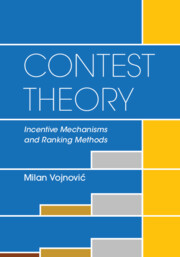Book contents
- Frontmatter
- Contents
- Preface
- 1 Introduction and Preview
- 2 Standard All-Pay Contest
- 3 Rank-Order Allocation of Prizes
- 4 Smooth Allocation of Prizes
- 5 Simultaneous Contests
- 6 Utility Sharing and Welfare
- 7 Sequential Contests
- 8 Tournaments
- 9 Rating Systems
- 10 Ranking Methods
- 11 Appendix
- References
- Index to Notations
- Index
6 - Utility Sharing and Welfare
Published online by Cambridge University Press: 05 January 2016
- Frontmatter
- Contents
- Preface
- 1 Introduction and Preview
- 2 Standard All-Pay Contest
- 3 Rank-Order Allocation of Prizes
- 4 Smooth Allocation of Prizes
- 5 Simultaneous Contests
- 6 Utility Sharing and Welfare
- 7 Sequential Contests
- 8 Tournaments
- 9 Rating Systems
- 10 Ranking Methods
- 11 Appendix
- References
- Index to Notations
- Index
Summary
In this chapter we consider systems that consist of individuals who generate some type of production outputs and are awarded shares of the resulting utility of production according to a utility sharing mechanism. Think of systems in which individuals make contributions to one or several projects that for each project amount to some value of utility of production. Contributors to each project are awarded according to a utility sharing mechanism that determines how the utility of production of each project is shared among those who contributed to it. Such systems arise in many real-life situations. For example, in the context of online services, users may contribute to activities such as online content creation or software development and may be awarded credits for their contributions in various kinds such as monetary payments, attention, and reputation. Another example is that of scientific collaborations where scientists work jointly on research projects and receive credits for the impact of their research results. In this case, the value of credit received may depend on some measure of the impact of the work on society and how much each individual contributed toward the success of the project. It is natural in such scenarios to consider strategic individuals who aim to selfishly maximize their individual payoffs, both in non-cooperative and cooperative strategic settings. A central question of interest here is that of the efficiency with respect to the social utility of production in environments where individual objectives are not necessarily aligned with the social objective. We are especially interested in evaluating the efficiency of utility sharing mechanisms that are simple and commonly deployed in practice; for example, sharing of the produced utility of production according to equal shares, sharing that is proportional to individual contributions, or sharing according to fixed shares depending on the ranks of individual contributions.
The class of contests considered in the present chapter differs from those in previous chapters in that prizes are shares of the utility of production, which is a function of effort investments, rather than shares of a fixed prize purse. Another important distinction is that in the present context we also consider collaborative environments where it is natural for players to form coalitions. This asks us to go beyond the solution concepts from non-cooperative game theory to consider those that account for strategic cooperation among players.
- Type
- Chapter
- Information
- Contest TheoryIncentive Mechanisms and Ranking Methods, pp. 301 - 358Publisher: Cambridge University PressPrint publication year: 2016



